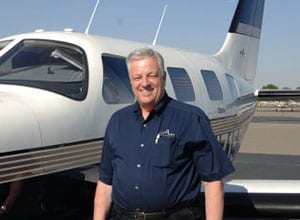Jerry Nemier - Flight Instructor
Bay Area Flying Club
| Flight Instructor: |
CFI, CFII |
| Certificates Held: |
Airline Transport Pilot Single Engine Land, Commercial Single Engine Land, Instrument Rated |
| Education: |
|
Since my father loved aircraft and was on the first aircraft carriers in the Navy (USS Langley and USS Ranger) up to the start of WWll and based at Alameda Naval Air Station until the end of the war, I was exposed to flying at a young age. I started saving money to learn to fly when I was 12 years old, built aircraft models, and read every book on the subject of flying I could find.
I soloed at San Carlos Airport on 3 August 1962 and received my Private Certificate that same year. I worked at the Palo Alto Airport for a year and a half maintaining the airport, runway, and fueling while going to college and supporting my flying. Then I worked at the Piper Dealer/Flight School at SJC. While there, I earned my Commercial Pilot certificate and Flight Instructor Rating. After a couple years, I moved to a new flight school at SJC where I instructed for four years and earned my Instrument Instructor and Multi-engine ratings and eventually was Chief Pilot at their second office at San Carlos Airport. Over the years I have met many famous pilots, both civilian and WWll aces from all three sides of WWll. What an adventure!
In March 1969 I was hired by United Airlines where I remained until my official retirement as the senior Captain on 1 Jan 2002. I flew domestic and international: Hawaii, London and Paris (my favorites). My favorite airplane was the B-737-200 on which I logged 15,135 hours and was the most fun. It was great to fly the 12-hour flights from SFO to London and Paris over Greenland, Iceland, Scotland, and England. I got to fly over England, France, and the White Cliffs of Dover where so many of my WWll heroes flew meeting the Luftwaffe over the channel.
After my 30+ year career, I returned to flight instructing for Ahart Aviation at LVK, which I did for 14 years until Ahart closed. I have always been very proud to be a flight instructor and count it as one of the highlights in my career. Now I continue to instruct part time with Bay Area Flying Club.
5 useful questions to ask an instructor:
Why did you become a flight instructor?
Regardless of the answer, the way an instructor talks about why they fly is what is important. Look for
someone that is excited by teaching. They should have a genuine interest in giving others the gift of flight.
How long have you been flight instructing?
Some Instructors have thousands of hours under their belts and have been flight instructing for their entire
careers. Others have a few hundred and are just beginning. A seasoned instructor will have a lot of experience
but may have a set teaching style. A freshly minted instructor has less aircraft time but is able to relate to
common learning obstacles, having undergone their own flight training in the not too distant past. There are
advantages to both types of instructor.
How do you keep track of your student’s progress?
Using a syllabus is essential so that both student and instructor can track progress and milestones so make
sure your instructor uses one. Talk to other students and ask them what kind of reading their doing, what
books they’re using and the type of homework they’re getting. There should ALWAYS have some type of “homework”
assignment at the end of each lesson.
What is your availability?
Some instructors are part-time and work separate jobs during the week. Others are full-time, but may want to
have personal and family time on the weekends. Find an instructor with compatible availability. Flying at least
twice a week is the best way to progress quickly through accomplishments with less effort and less overall costs.
Choosing an instructor that is able to fly on the same schedule helps to keep flight training on a consistent path.
I’ve heard people talk about “stalling an airplane.” Can you tell me what it means?
This is a classic question. Regardless of knowing what an “aircraft stall” is or not, how an instructor explains
this concept will give great insight into how they can explain concepts. Are they patient? Do they use simple
terminology that is easy to understand? Do they ask questions to make sure their student understands, or do they
over simplify to brush off the question? Find an instructor whose instructing style is a good match.

